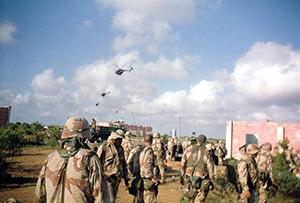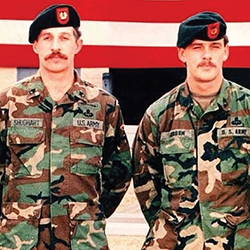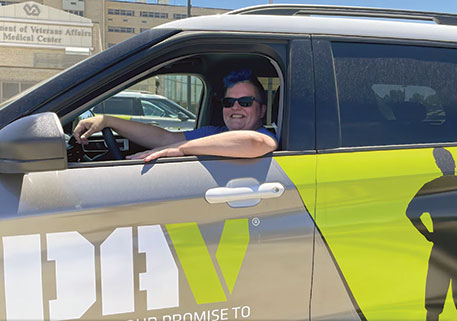 Larry Perino is stoic as he recalls a Black Hawk helicopter falling from the sky. As an Army Ranger and platoon leader on the streets of Mogadishu, Somalia, his instincts kicked in, with one thought racing through his mind: We’re not leaving now; we need to get to the crash site.
Larry Perino is stoic as he recalls a Black Hawk helicopter falling from the sky. As an Army Ranger and platoon leader on the streets of Mogadishu, Somalia, his instincts kicked in, with one thought racing through his mind: We’re not leaving now; we need to get to the crash site.
“I could generally see where it was,” said Perino. “It looked like it was two blocks away.”
Perino attempted to direct the Ranger chalk he was leading to the downed aircraft but quickly ran into a barrage of heavy enemy fire.
“As soon as we made that left turn, it was like turning in to a wall of lead,” he said. “Lots of gunfire everywhere, [rocket-propelled grenades] going up and down the street.”
At one point, enemy bullets skipped between his legs while he engaged a Somali fighter.
Tragedy struck while one of Perino’s team leaders, Cpl. Jamie Smith, was firing an M203 grenade launcher at an enemy fighter.
“I have my right arm on his shoulder, and I’m pointing with my left hand, and I’m trying to tell him where to shoot when these rounds hit,” said Perino. “And one of them, how it missed me, I have no idea, but it hit him, and that’s where it hit his femoral artery.”
Medics never stopped caring for and attempting to save Smith until he died from his wounds late that night.


The fighting occurred on Oct. 3, 1993, when Perino and other soldiers from Task Force Ranger muscled into a hornet’s nest on a raid to capture rebel leaders. What became popularized as “Black Hawk Down,” the Battle of Mogadishu was, at the time, the fiercest combat the American military had seen since the Vietnam War. By the end of the relentless 15-hour battle, 18 U.S. service members were dead and another 73 wounded.
American intervention in Somalia began in 1991 when a severe famine and a collapsed central government hurled the beleaguered nation into civil war. Faced with a humanitarian disaster, President George H.W. Bush ordered the military to join the United Nations mission to provide security for relief efforts. At the same time, warring factions of rebel clans competed for control, filling a power vacuum by governing through violence.
Conditions came to a head in June 1993 when U.N. troops suffered their greatest loss in nearly three decades. Twenty-five Pakistani U.N. peacekeepers were killed in an ambush that injured another 59. Three Americans were also wounded, and estimates of Somali deaths range from 16 to 35. The U.N. ultimately blamed the rebel leader and former Somali military general, Mohammad Farah Aidid.
That prompted President Bill Clinton to dispatch a team of elite American soldiers and special operators with a single mission: kill or capture the terrorist leader. On the morning of Oct. 3, intelligence indicated that two of Aidid’s lieutenants would meet at a compound in the Bakaara Market, a treacherous area known for heavy rebel and other nefarious activities.
After a quick brief, the assault force headed to the time-sensitive target. Rangers repelled from Black Hawks operated by the 160th Special Operations Aviation Regiment, setting up a cordon around the target building. That’s when the first American casualty occurred.
Army Pfc. Todd Blackburn was injured after the pilots quickly maneuvered the aircraft to evade a rocket-propelled grenade (RPG). The move saved everyone on board from near-certain death, but the jostling caused the young Ranger to fall 60 feet to the ground.
“It slowed them down,” said Mark Bowden, author of “Black Hawk Down: A Story of Modern Warfare.” “The essence of the kind of snatch-and-grab mission they undertook was to get in and out fast.”
Despite the setback, the raid’s targets, and 21 others, were captured just 20 minutes after Blackburn’s fall.
“That part of the mission was a success—which is lost history,” said Lee Van Arsdale, a retired Army colonel who served for decades in an Army Special Missions unit.
Somali rebels had observed and learned from six previous American mission successes, drastically reducing the enemy’s response time. Armed and angry rebels descended upon the Rangers and operators. A Humvee gunner, Sgt. Dominick Pilla, became the day’s first U.S. soldier killed in action.
Then, an iconic line was heard across the radio: “We got a Black Hawk down.”
The crash of that first helicopter, brought down by an RPG, caused the mission to shift from a raid to a rescue. Pilots Cliff Wolcott and Donovon Lee Briley, both Army chief warrant officers, were killed instantly. Two survivors of the crash began defending the wounded and dead Americans.
“One of the [American special operator] snipers in the back of the helicopter, Dan Busch, held the militia off single-handedly at the cost of his own life,” said Van Arsdale.
The urgent situation escalated again when a second Black Hawk, the one Perino flew in for the raid, was brought down by another RPG about a mile from the target compound. With a second crash site unsecured, two U.S. special operators, Sgt. 1st Class Randy Shughart and Master Sgt. Gary Gordon, repeatedly asked to touch down from their helicopter to secure the crash site.
The duo was inserted and defended surviving pilot Chief Warrant Officer 2 Mike Durant. With enemy fighters enveloping the site, Shughart and Gordon were killed. The two posthumously received Medals of Honor—the first since Vietnam—for their heroic actions.
Van Arsdale knew both men, having served in the same squadron for years.
“They were both the epitome of the quiet professional,” said Van Arsdale.
“I had a number of people tell me they went on a suicide mission, and I disagree with that because that’s just not how people like that are wired,” he added. “They saw a job that needed to be done and volunteered to do it, plain and simple.”
“They knew the odds were stacked against them, but there was nobody else,” said Perino.
Durant was freed after being held for 11 days by clan fighters.
For the Americans still in the city, rebels attacked from nearly every direction, drawing a thundering cacophony of modern warfare.
“The biggest thing was the noise,” said Van Arsdale. “You’ve got continuous small-arms fire, automatic fire, and rocket-propelled grenades going off. It’s just freaking loud.”
And the fighting was harrowing. American vehicles returned to their base to regroup, leaving some 99 soldiers surrounded throughout the city. AH-6 Little Bird helicopters conducted strafing runs to protect the trapped Rangers. Estimates of dead Somalis range from 300 to a few thousand.
An American rescue element reached trapped Rangers and Durant’s downed helicopter in the early hours of Oct. 4. By 6:30 a.m., the Rangers and operators piled into crowded U.N. and American vehicles and reached the Pakistani-held Mogadishu Stadium.
“My feet never even touched the ground,” Perino said of entering a rescue vehicle. “I remember hanging in there, and I was almost horizontal.”
Others ran out of the city on foot.
The story and valor of this battle are captured in Bowden’s New York Times bestseller “Black Hawk Down.” The book and subsequent movie were massive successes, a surprise for Bowden.
“I knew it was a great story, and I thought it was an important story, and so I was thrilled to be doing it. But there was no suspicion that this would become a big commercial project or a movie,” he said.
In 2021, the Army announced that 60 special operators would have their awards upgraded for their actions in Mogadishu. Fifty-eight awards, including Perino’s, were upgraded to the Silver Star, the third-highest military valor award, and two Distinguished Flying Crosses, an honor reserved for heroism while in aerial flight.
As for the lasting legacy of “Black Hawk Down,” Bowden said he aspires to enlighten people about combat’s dark nature and horrors.
“I hope that when people read that story, they realize the incredible courage and real nobility of those willing to do these kinds of missions,” said Bowden. “And they also understand a government’s moral and ethical obligations to use that kind of force wisely.”





